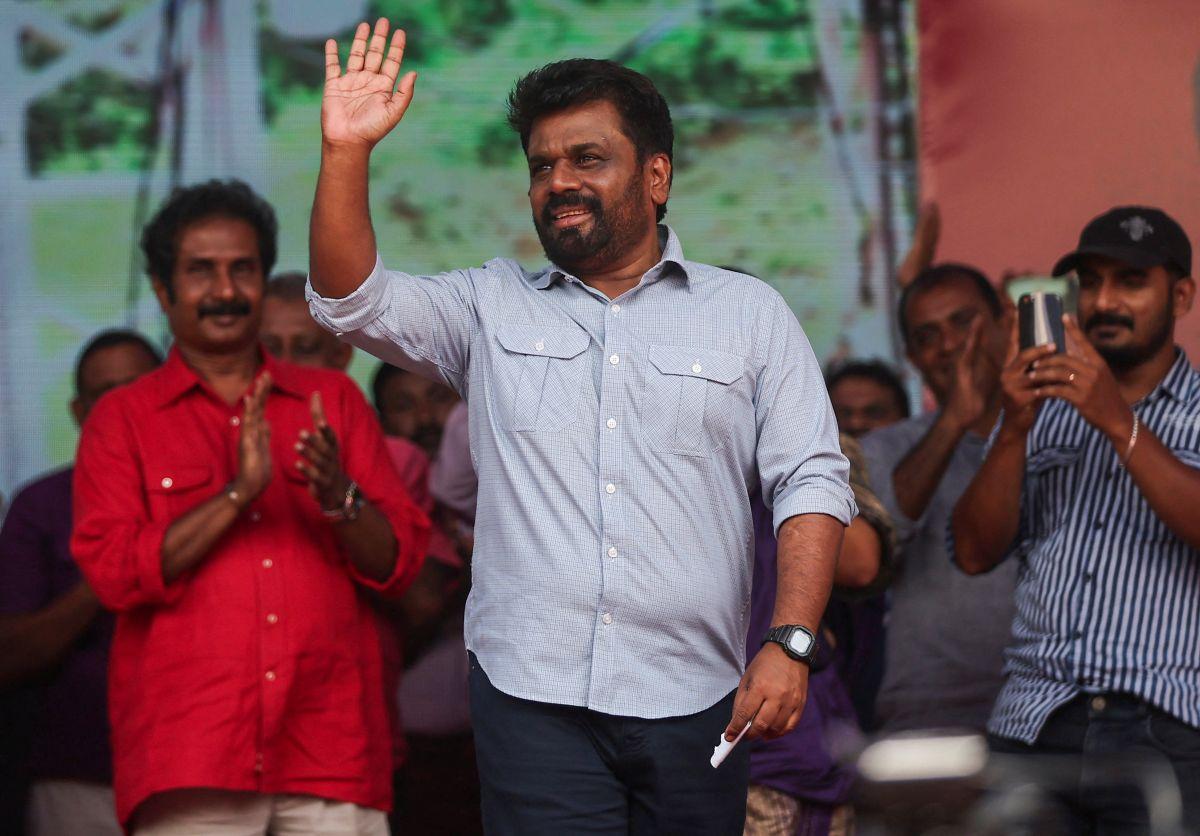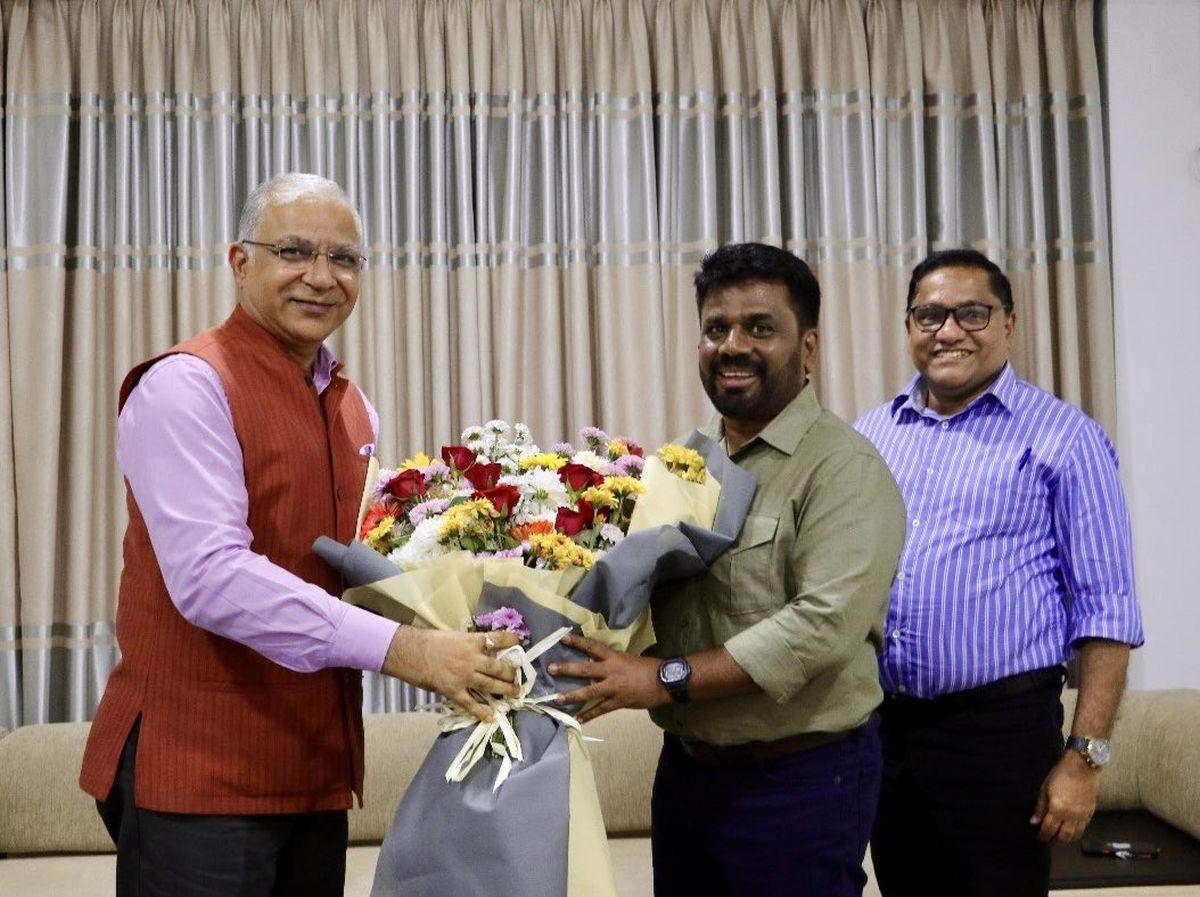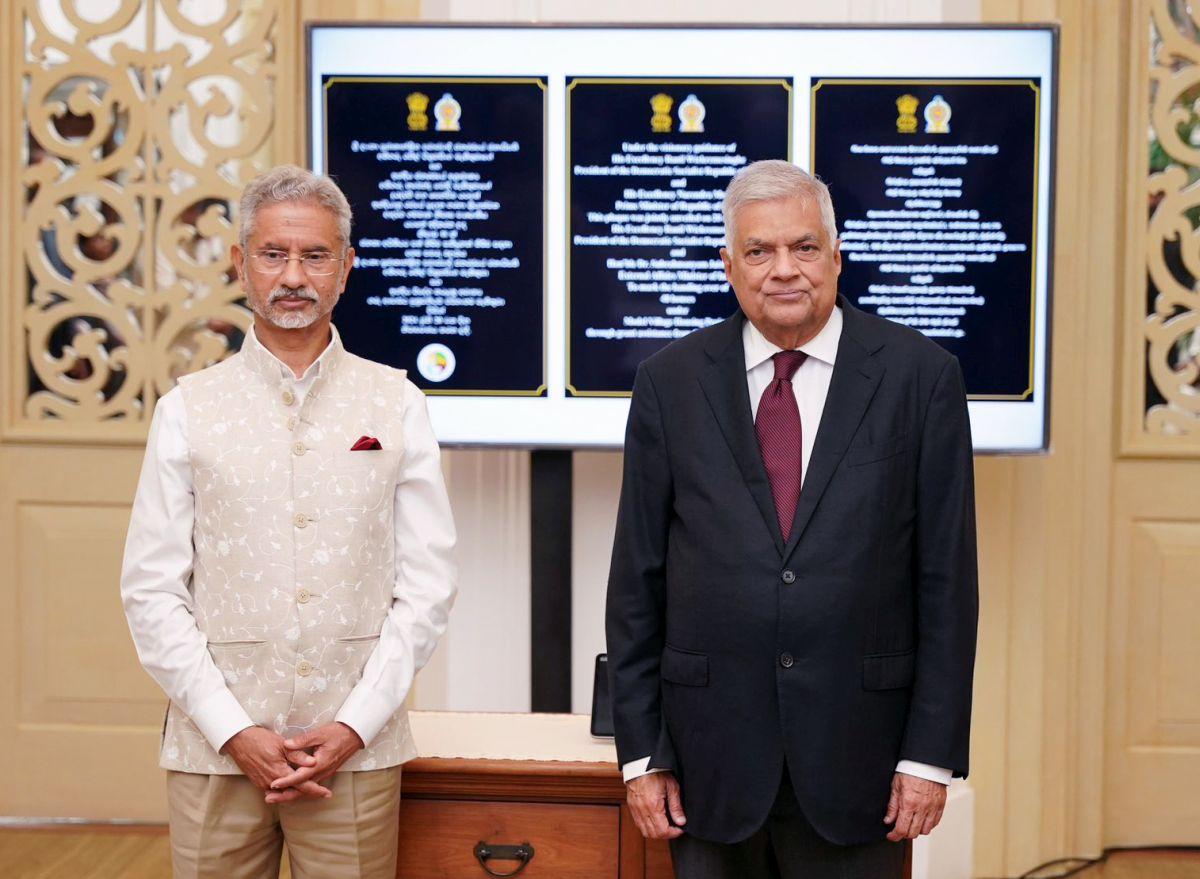 | « Back to article | Print this article |
'We have to keep a watch because India-Sri Lanka has a history that whenever there has been a change in government, either the connectivity projects have been questioned or cancelled or revived.'

That India's High Commissioner to Sri Lanka Santosh Jha was the first diplomat to call on the newly elected Sri Lankan President Anura Kumara Dissanayake soon after the presidential election results were declared in the island nation on Sunday, September 22, 2024 underlines the importance India attaches to its relationship with its neighbour and also how closely New Delhi was following the elections.
The Indian mission later posted on X: 'India as Sri Lanka's civilisational twin is committed to further deepen ties for the prosperity of the people of our two countries.'
Prime Minister Narendra D Modi followed with his own post: 'Congratulations @anuradisanayake, on your victory in the Sri Lankan Presidential elections. Sri Lanka holds a special place in India's Neighbourhood First Policy and Vision SAGAR.
'I look forward to working closely with you to further strengthen our multifaceted cooperation for the benefit of our people and the entire region.'
The importance India attached to the Sri Lanka elections is clear from the flurry of high-level visits of Indian officials to Colombo in recent months.
In June, External Affairs Minister S Jaishankar visited Sri Lanka and met all the prominent presidential contenders.
Three weeks prior to the elections, National Security Adviser Ajit K Doval also met all the prime aspirants across party lines when he traveled for the Colombo Security Conclave agreement.
While India kept its options open, it also tracked the rise of the Left-leaning AKD, as the new president is popularly known.
An administrative novice and an unknown quantity as far as foreign policy and international relations are concerned, India followed AKD's progress so that it is not caught off guard in case of his ascent to power.
An Indian official who was once posted in Sri Lanka said AKD's popularity was clear after he became one of the central figures in the popular uprising, called Aragalaya, that ousted the much-despised president Gotabaya Rajapaksa.
His growing stature prompted India to invite him to New Delhi for discussions in February.
But now the question South Block mandarins face is how will AKD deal with India and the rest of the world, particularly China.
On the face of it, his natural affinity could be with Beijing given his ideological leanings.
But Yashvardhan Sinha, former Indian high commissioner to Sri Lanka, is optimistic.
"Once he is in, he will appreciate the full spectrum of the bilateral relationship between our two countries and he will work to strengthen it. Let him get sworn in, we shouldn't make second guesses."
Ambassador Sinha stressed that AKD is not an unknown figure.
"The good part is he is not completely unknown to us, he has come here and we will be happy to engage with him. He is the choice of the people of Sri Lanka and we should respect that."
While India watches him closely, AKD's main focus will be the economic health of his country and its people.
While his predecessor Ranil Wickremesinghe has nursed the economy to some early signs of recovery, the challenges are extremely steep for AKD.
And that may work to India's favour because the gigantic task in front of AKD may force him to follow a pragmatic path rather than be a prisoner of his ideological beliefs.

"Given the economic situation of Sri Lanka, I don't think Anura can afford too many changes in foreign policy. After all, India has assisted the country a lot, for instance the $4 billion easy loan," says Aditya Gowdara Shivamurthy, Associate Fellow, Strategic Studies Programme, Observer Research Foundation.
'Actually, I think he will try to balance his relations with India and China because both are creditors, major lenders. So, I don't sense any anti-India policy coming from him," Shivamurthy said, adding that India did well to not hedge its bets.
"India was open to engaging with anyone coming to power because perhaps India sensed there was unpredictability," he points out.
New Delhi will also be encouraged by the fact that AKD has not been expressly anti-India in his utterances during the election campaign and even prior to that.
Rather, his party, the Janatha Vimukthi Peramuna (JVP), known for its extremist, jingoistic and violent ways in the past, has been very pragmatic.
The JVP today is nowhere near to its previous avatar.
"I think they have mellowed down a lot. In fact, the during the election campaign Anura has not promised anything that is anti-India in nature, most of it has been domestic politics and economy-oriented", said Shivamurthy.
"We know of the JVP's past anti-India stance, but during the campaign they took a pragmatic approach," notes Gulbin Sultana, Associate Fellow, Manohar Parrikar Institute for Defence Studies and Analyses.
"They were even critical of the IMF loan, but they realised that stopping or scrapping the loan would take the country back to the 2022 economic situation," adds Sultana.
The JVP's election manifesto mentioned that it would not stop the loan but only seek to amend some clauses.
"He will perhaps renegotiate because he wants to increase the public investment for the poor, health, education sectors, etc," says Sultana, who spent weeks in Sri Lanka before the elections.
"Anura did not say anything anti-India during the election campaign," she says. "On foreign policy, his manifesto mentioned national interest will be the priority, also they will not allow any third party to use Sri Lankan territory against any nation."
But this does not necessarily mean that India will not have any concerns. New Delhi is likely to closely monitor four fronts.

One, the fate of broader connectivity projects -- maritime, air, energy and power, trade, economic and financial, and people-to-people connectivity -- which were agreed upon when Wickremesinghe was in New Delhi last year.
"We will have to wait and watch whether AKD cherry picks certain initiatives. I don't think he can scrap the projects as his economic policies are more inward oriented. But we have to keep a watch because India-Sri Lanka has a history that whenever there has been a change in government either the connectivity projects have been questioned or cancelled or revived. So we have to keep an eye on that front," says Shivamurthy.
Two, India will keep a watch on how the new President deals with the IMF loan issue.
India has played a crucial part and it will hope that Sri Lanka continues to follow the strict mandatory set of guidelines.
Third, what will be AKD's China policy?
And fourth, India will monitor his domestic and economic policies because he has promised a lot.
"As far as the Tamil factor is concerned, all Sinhala politicians have been hesitant to implement the 13th Amendment and I don't think Anura is any different," says Shivamurthy.
"What is a possibility is that he has promised a new constitution. He may do away with the 13th Amendment that India had been advocating. They may look for an out of box solution in case he is really serious about Tamil reconciliation," adds Shivamurthy.
On the issue of a new constitution, India will mostly look at it as a sovereign matter.
"As far as India's interests are not harmed, I don't think India will intervene. I think now we just have to wait and watch, what is rhetoric and what is the reality," explains Shivamurthy.
For AKD, this is a chance to prove his mettle as a politician and an administrator.
After his victory, he said: 'The millions of eyes filled with hope and expectation push us forward, and together, we stand ready to rewrite Sri Lankan history. This dream can only be realised with a fresh start.'
'The unity of Sinhalese, Tamils, Muslims, and all Sri Lankans is the bedrock of this new beginning. Let us join hands and shape this future together!'
Feature Presentation: Aslam Hunani/Rediff.com